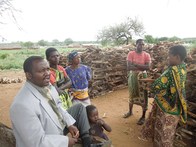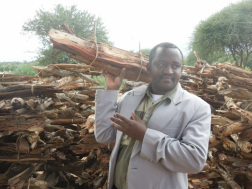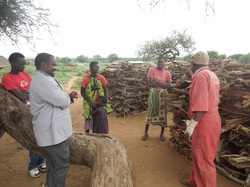
 The director of KIHO with a firewood bundle
The director of KIHO with a firewood bundle At the moment the community is already unable to produce charcoal anymore and they themselves say that, they will run out of doing firewood because the distance becomes too big, it is just very obvious that the practice of firewood-making is not sustainable. However, the women claimed that, they do not plant trees because there is just not enough water available. The problem is that, it is a semi-arid area with very big changes in the rainfall pattern and the rain becomes more and more unreliable. The nearest water source is 7km away in an Islamic school. It is too long of a distance to fetch water for a tree nursery.
A Lutheran church-sponsored borehole worked only for a short time and has dried up. Most of the houses have traditional roofs with grass; therefore roof-top rainwater harvesting is also hardly possible. The UN World Food Program through the Diocese of Same – Caritas department sponsored two charcoal dams to harvest surface run-off water. This allows livestock to have water access only for one or two months after the rainy season ends. As a consequence, both people and livestock suffer from prolonged severe water shortages.
 Intensive discussions with the group
Intensive discussions with the group KIHO decided on the spot to arrange a meeting with the whole sub-village in the near future. Then, it is possible for each and every one of this community to air their concerns in an inclusive environment. We still have to come up with more concrete proposals but it is clear that we want to get them organized in groups with their own constitutions so that they have more ties among each other. Currently they are not properly organized and they even undermine their effort to sell the firewood for a higher price. Some women are so desperate to get at least some money so that they can provide food for their children. For this reason they opt to sell the firewood for TSH 400 instead of getting some more profit by selling the firewood for TSH 500.
Finally, KIHO is still convinced that some form of tree planting is necessary to rehabilitate the area of the destructive logging of trees. This can be done through an in-depth technical hydrological survey and study of groundwater sources which is potentially available in the area. This could then be followed by supporting the community with drilling of deep borehole which will supply water for the people, livestock, forestation and kitchen gardening.
 RSS Feed
RSS Feed
